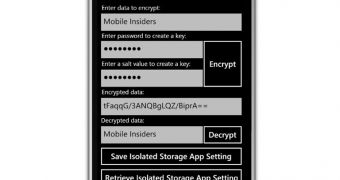Microsoft's next generation mobile operating system, Windows Phone 7, should hit the market on devices in about three months from now. As the release date approaches, newer details on the platform emerge, including additional info on its capabilities, or tip on how developers can benefit from certain features. The latest reports on the matter brought to the spot light a manner in which multi-touch behavior can be enabled in Windows Phone 7 software solutions, complemented by a series of details on the Data Encryption features of the operating system.
Laurent Bugnion from GalaSoft (via WMPoweruser) came up with a tutorial aimed at explaining developers the manner in which they can enable multi-touch in apps, and published two videos to show how that works. The video embedded below shows how the MultiTouch Behavior that Laurent Bugnion developed works, what gestures are available, and how it can be added to other applications developed for Windows Phone 7. The second video with the solution, available on his website here, offers a detailed explanation on the code.
The features its solution sports include: - Scale, Rotate, Translate are supported. - Possibility to show markers on the screen for demos/projections/videos. - Debug mode with addition on-screen information. - “Mock” mode for development without multi-touch screen. Simulate fingers with just one mouse. - Enable/disable Scale, Rotate, Translate X and Y individually. - Constrain Scale with minimum and maximum value.
In related news, we learn that Windows Phone 7 can do data encryption too, as Microsoft’s Rob Tiffany shows in a recent blog post (via mobiletechworld). The mobile platform comes with support for cryptographic algorithms such as AES, HMACSHA1, HMACSHA256, Rfc2898DeriveBytes, SHA1, or SHA256. Basically, Rob Tiffany seems set to prove that Windows Phone 7 does not come to shelves only with SSL encryption via IEMobile, but with additional options in the area too.
Developers can benefit from this state of facts, not to mention that additional security elements should be taken into consideration: - Apps are tested, digitally signed and securely delivered via the Windows Phone Marketplace - No side-loading of potentially insecure apps - SSL for data in transit - Managed apps run inside secure sandbox - Apps have private, inaccessible Isolated Storage - Exchange Policies including PIN lock enforcement + Remote wipe
MultiTouch Behavior for Windows Phone 7 Highlights from Laurent Bugnion on Vimeo.

 14 DAY TRIAL //
14 DAY TRIAL //